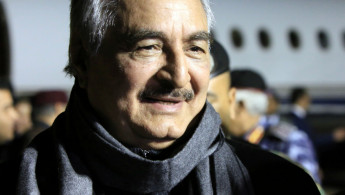Russia trying to gain influence in Libya: US general
Russia is trying to expand its influence in Libya through a combination of military means and oil and weapons sales, a top US general said Friday.
General Thomas Tom Waldhauser, who heads the US military's Africa Command, said Russia is "on the ground" in the border region between Egypt and Libya.
"They are trying to influence the action, we watch what they do with great concern," Waldhauser told Pentagon reporters.
"In addition to the military side of this, we've seen some recent activity in business ventures - whether it's oil, whether it's weapon sales that perhaps were stopped when the (Muammar) Gaddafi regime took place."
A US official this month told AFP that Moscow apparently has deployed military forces to a base in western Egypt.
The official said Russia appears to have sent special operations forces to an air base at Sid Barrani, which is located about 100 kilometers (60 miles) east of the Libyan border.
The Russian Defence Ministry has denied special forces were in Sidi Barrani, but the Kremlin has said Russia is interested in Libya's stabilization so the country "does not become a breeding ground for terrorist recruits."
Following the ouster and killing of Gaddafi in 2011, an array of rivals has been vying for control of Libya.
The Government of National Accord currently is supported by the United States and the United Nations, but a rival administration in the country's far east has refused to cede power to the GNA.
That group is supported by strongman Khalifa Haftar, who has visited Russia, Waldhauser said.
"The Russians and Haftar, the linkage I think is undeniable at this point in time," he said.
The United States, which last year helped GNA forces push Islamic State fighters from the coastal town of Sirte, still has a small number of troops in Libya to "develop intelligence and take out targets when they arise," the general said.
He added that between 100 and 200 IS fighters remain in western Libya.
"They're staying off the communication lines, they don't want to surface and talk, they're just trying to maintain a presence," he said.





 Follow the Middle East's top stories in English at The New Arab on Google News
Follow the Middle East's top stories in English at The New Arab on Google News


